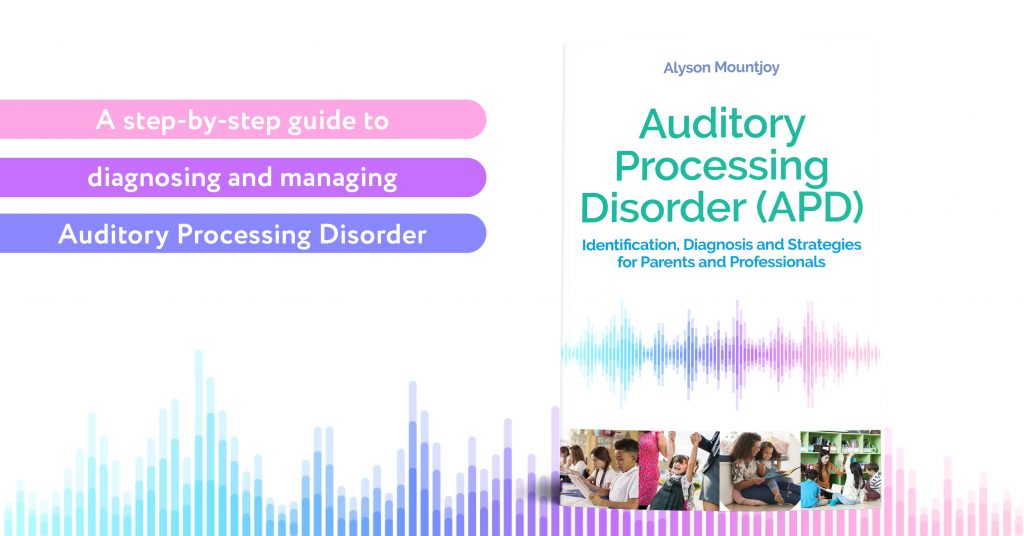Alyson Mountjoy is the founder of APD Support UK. She has over 20 years’ experience supporting families, researching and writing about APD. Alyson’s son has diagnoses of auditory processing difficulties, Visual Processing Disorder, hyperacusis and sensory sensitivities. She has recently published Auditory Processing Disorder (APD).

The questions I am often asked about APD are “Why?” “What?” and “How?” APD is known as an invisible disability which means that individuals with this condition do not look ill, or disabled; there are no outward signs until you speak to them. APD seems to be like a well-kept secret, but this has to change.
Why do people have APD? APD is a medical condition of neurological origin which affects how someone processes sound including speech. It can be mistaken for deafness, but it exists in those with perfect hearing (as well as those with hearing loss). Without the brain we would not understand what we hear, so APD should be considered a hearing problem. APD can be inherited, or caused by problems before, during or at birth. There are also many ways to acquire it, either in childhood or later in life. APD can affect up to 7% of children (or 10%, depending what you read) and APD can affect up to 20% of adults. By comparison, Autism affects only 1.1% of children, yet is much more widely known.
What are the effects of APD?
The effects of APD will vary from person to person, as will severity. Individuals with APD are all affected uniquely. People with APD hear what is said to them: it’s just misunderstood by the brain. The effects can be random and intermittent throughout the day and there are good and bad days. One minute, they might understand; a moment later it could all be gibberish. There may be gaps, or just the start, middle or end of a sentence makes sense. The order of words or a string of instructions can be jumbled up and it’s harder to understand speech when it’s noisy. These are just some of the more common problems, but you don’t need them all to receive a diagnosis of APD. APD is something of an enigma. This inconsistency of symptoms means it’s difficult to identify, also making it hard for other people to believe it even exists. It’s not uncommon for a child with APD, or their parents, to be told they are making it up.
APD is not a learning disability in itself, but for many children it can have a huge impact on learning: imagine trying to learn with all that going on? It doesn’t affect intelligence, yet children with APD are often called stupid, slow or even lazy. It affects all aspects of life because it affects both receptive and expressive communication, both of which we need every day. Therefore, it can affect education, relationships, work and more. Also, APD never exists alone. There can be any number of co-existing conditions and difficulties which can all work against each other.
Their difficulties and other people’s response to them (a lack of understanding, acceptance and support) often lead to poor confidence and self-esteem, causing stress, anxiety and lasting damage to a child. This continues into adulthood, affecting their education and career prospects, and affecting future relationships too. But it can all be prevented if children with APD receive early identification, access to appropriate, specialist testing and diagnosis by a consultant in audio-vestibular medicine. Then they need full support for their APD and all other conditions at school and at work. Knowledge about how APD affects them and help in developing coping mechanisms and self-advocacy skills are also essential. It’s a proven recipe for success.
How can we help?
APD might still be seen as a secret condition, an invisible disability. But the millions of people worldwide who have it are not invisible and they deserve to be heard. Too many children and adults with APD have been told that they aren’t paying attention, that they aren’t listening, when they listen as hard as they can every day to try make sense of anything, and still they fail. APD is not an attention problem and such comments are a constant reminder of their struggles, yet the secret to helping individuals with APD is for us to listen. We can all play our part.
- Medical professions can help by listening to a parent/adult who requests APD testing. Refer them to an appropriate testing centre (and only specialist testing can rule it out);
- Education professionals can help by listening to a child who is struggling at school. Provide the reasonable adjustments for APD and all other conditions which they need to access an appropriate education: this is a legal requirement.
- Friends and family members can help by listening to the person with APD: Believe them; ask how you can help and communicate in the way that they need you to, because they want to communicate with you;
- Employers can help by listening to an adult who needs reasonable adjustments at work. Provide them: it’s a legal requirement in the workplace too.
So, if someone you know (or even if you don’t) tells you that they have APD, make sure you’re listening. Only by listening can we hope to understand and improve the lives of others.